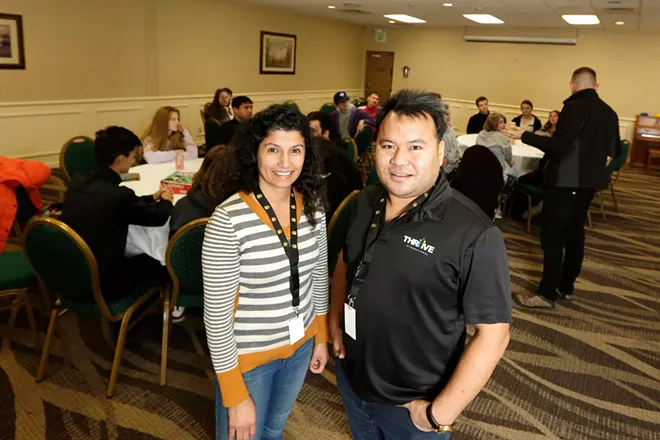Navigating the Spokane County Courthouse is confusing enough without a language barrier. Yet, until recently, there were very few resources to help people who speak limited to no English steer through the already complicated court system.
For instance, people who ask for certified interpreters for their court hearings have to seek help from someone who only speaks English — ironically facing a language barrier to access the language resources that do exist.
The good news is, with the urging and help of advocacy groups, the county may soon have resources available in multiple languages, including Spanish and Russian, as well as Marshallese and Arabic.
One group pushing for change, Mujeres in Action, works with victims of domestic violence and sexual assault within the Latinx community (the organization prefers this gender-neutral term). Advocates with the organization successfully worked with the court administrator to put up a sign that says "I speak..." followed by language names, written in both English and other languages. By pointing at the correct language, people can get in touch with the proper interpreter.
While the sign is helpful, interpreters are only available for court hearings or attorney meetings, not for routine court activities such as filling out forms. More is needed to make the court system accessible to those who have a limited understanding of English, says Ana Trusty, director of communications for Mujeres in Action (MiA).
"Not only does that courthouse look like a maze, but figuring out who can do what is another issue in itself," Trusty says. "It's really hard to navigate for somebody that speaks English, much more so for somebody that doesn't."
MiA advocates tell their participants about the pros and cons of officially seeking things such as a civil protection order (sometimes known as a restraining order) or a parenting custody plan.
Local police are not supposed to ask about immigration status, and the courthouse is supposed to serve as a safe space where immigration enforcement is not allowed, Trusty says. But still, that extra layer of fear may be there for victims, along with more complex emotions: If an abuser is found guilty of certain crimes, and they're undocumented, they may be deported.
"We work with a lot of Latinx community members who don't speak English and are undocumented, and they're fearful of the court system," says Trusty. "Even if they're undocumented there are rights that the United States offers them. As we navigate the court system with participants, we realize there are a lot of barriers and gaps, and even when we helped one person, that wasn't helping the broader community."
Rather than work with victims one by one to translate forms, for instance, MiA has started working with other nonprofits and Spokane County Clerk Tim Fitzgerald to address some of the need by translating the directions for filling out civil protection orders into the five most common languages outside of English in this area.
Fitzgerald says he's enthusiastic about improving that access, and his office already has those directions translated into Spanish and Russian.
"What we've been working on is trying to get the instructions on these six types of civil protection orders written in different languages so people can read that and fill out their legal documents before they go down to the court," Fitzgerald says. "The next thing we're trying to do is get the actual orders themselves translated into Spanish and Russian. That way they can see the order, they can read the order, and when they get the English version they'll have a better understanding."
SPANISH, RUSSIAN, MARSHALLESE AND ARABIC
Part of what's driving the push for language access in the courts is a change to protective orders that the Legislature made. Starting this July, a simplified form has enabled victims to seek one of six different civil protection orders (domestic violence, extreme risk, sexual assault, stalking, anti-harassment or vulnerable adult) by filling out a single document. In the past, both victim and court time would often be wasted if someone chose the wrong form for the type of order they needed. The new form is meant to avoid sending someone back to fill out the right paperwork.
Along with simplifying the protection order process, lawmakers mandated that the Administrative Office of the Courts, which works with courts at all levels across Washington state, translate the brochures and directions for protection orders into the five most common languages outside of English.
However, those languages needed statewide vary from what's most helpful in Spokane.
The Administrative Office of the Courts is working to translate those directions by a Dec. 30 deadline into Korean, Chinese, Spanish, Tagalog and Vietnamese, says office spokeswoman Lorrie Thompson by email.
But according to a records request that MiA made to Spokane County's courts, the languages that were most commonly requested for interpretation services over the last three years were Spanish and Russian, closely followed by Marshallese and Arabic. It's hard to say what the fifth most common language would be as a few other languages were commonly requested, including Chuukese, Thai and Tigrinya.
"I've got two already done [in Spanish and Russian], and we're kind of looking at what we think are our other non-English populations, which could be Ukrainian, Marshallese and Arabic," Fitzgerald says. "We're putting this out there trying to figure out how best to get the top five that we need, or, if we see a trend where a specific community is coming in a lot, we'll try to make instructions for that language."
Fitzgerald says he hopes to work with MiA and similar organizations as they translate the most common forms and directions for those communities, and then send those documents to the Administrative Office of the Courts to ensure they meet legal requirements.
One of the difficulties for Spokane is that our courts have decided to use their own forms for many processes, rather than a standard form that might be used statewide. For example, in trying to simplify the single protection order form to fewer pages, the county now requires its own translation, Fitzgerald says.
BENEFITING AN ENTIRE POPULATION
Saw Gary, program manager for Thrive International, a nonprofit working with refugees from Ukraine and other places, was a court interpreter for about 10 years, helping translate Thai, Karen, Burmese and other Asian languages.
He says he regularly saw clients get confused as they tried to find the right courtrooms or offices within the courthouse, often getting sent back to the same place they'd been before.
One way to help could be hiring a court coordinator, Gary says, whose sole job would be to direct people to the forms and offices they need and help them navigate the complicated system.
"Hiring a cultural navigator here through the courts in Spokane would be helpful," Gary says.
Interpreters, like victim advocates, cannot help clients fill out their legal forms because they are not allowed to offer legal advice, Gary says.
However, MiA's advocates have been able to help with a workaround by translating the actual form questions into Spanish when needed.
Then, advocates like Citlalli Briseño (who is now the program supervisor for MiA's various services) can help clients use Microsoft Word to dictate their answers and copy them into the correct court forms. The software is able to convert Spanish voice dictation to text, and then once the victim reads over their words to ensure they are accurate, the software can translate it into English, as all forms need to be submitted to the court in English.
"We're hoping we can bring these things to light and help ease those barriers for participants. Because we're sure that it's not just in the Latino community," Briseño says. "The whole immigrant community is growing in Spokane, there's Russian, Marshallese, Ukrainian, a bunch of different people coming in, so this would benefit a huge population."
One of the most important elements to ensuring language access involves making sure that places like hospitals and the courts aren't having children or an abuser do the translation for someone, as the details can get lost in translation, sometimes intentionally, Briseño says.
"It's very disappointing to see, as an advocate, the hesitancy there is and the lack of accessibility there is for these resources," Briseño says. "They deserve to have a certified interpreter."
While advocacy agencies push for even more forms to be translated into other languages and ultimately would like to see the courts accept forms filled out in other languages, Spokane's office is taking other positive steps.
In addition to translation, Fitzgerald says he's working to secure a private room where advocacy agencies like MiA, Lutheran Community Services and the YWCA could sit with people to fill out their forms in private kiosks.
Right now, his team ensures that protection orders are immediately filed electronically with police so those are available to officers the moment someone steps outside the courthouse. Victims receive certified copies of their orders before they leave, but they are asked to wait on benches in the hallway while the team completes that work, Fitzgerald says.
"We're not doing a very good job with trauma-informed petitions for survivors of violence," Fitzgerald says. "They fill out these orders, they have to go to court, which can be intimidating, then they come back upstairs, and I would like to put them in a quiet area."
Fitzgerald submitted a funding request to the county for new laptops and a table and chairs through the COVID-related American Rescue Plan process, but he says he was told the request for a few thousand dollars was actually too small. Now, he'll wait to go through an official budget request to try to create that private area.
"Space in the courthouse is at a premium, but we're trying to figure this out," Fitzgerald says. "We're going to make this happen, I just can't give you a timeline. We understand the challenge." ♦



























